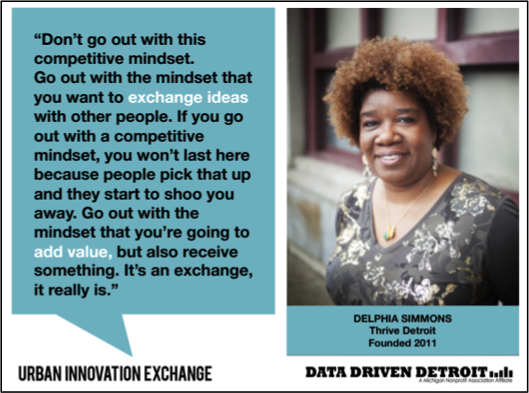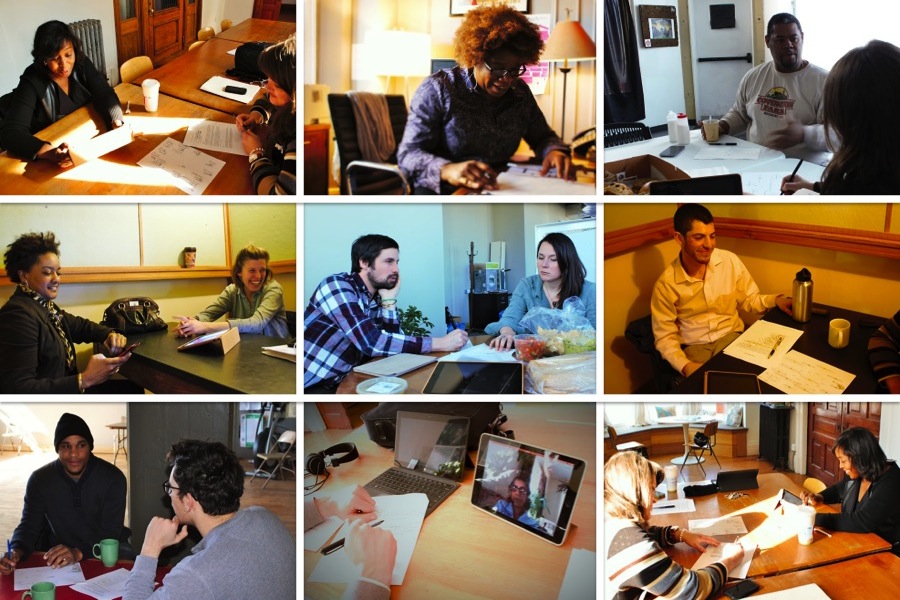Detroit Innovation Insights: Recommendations & Questions
Jessica McInchak, Data Driven Detroit and Claire Nelson, UIX |
Thursday, December 18, 2014
This is Part 3 in the Detroit Innovation Insights series which reveals the key insights collected by UIX and D3 through our three-year research initiative to identify and map the ecosystem of urban innovators and their projects across Detroit. Read back to Part 1 to learn about the motivating forces that sparked our three-year research initiative, and Part 2 to dig deep into our research methods and data insights.
In this post, we’re sharing how our research insights are prompting new questions and generating recommendations to shape the future of our work.
Innovation in Detroit is affordable now, but will it stay accessible?
Our urban innovators perceive Detroit as having complex characteristics that both attract and challenge their work. Innovators cite that the city is “very conducive” to innovative work because Detroit’s “problems force creativity, large spaces are available and affordable, and startup costs are low.” On the other hand, the city also presents many hurdles; innovators rank the top barriers to doing innovative work in Detroit as “lack of public transit, extensive poverty, and low educational opportunities.” (Respondents n=75)
To glimpse how our innovators work within these complexities, we asked them if they had any advice to offer aspiring innovators hoping to engage the Detroit community. Mark Covington of Georgia Street Community Collective speaks to a common theme of persistence and replies, “I’ve been here all my life. This is my city, and even now, we need to start doing things to make our city better. So don’t give up. And don’t make it about money. For yourself, I mean. If it’s a passion, go for it and don’t let anyone tell you that you can’t do it.”
 Reinforcing the collaborative spirit found amongst our innovators, Delphia Simmons of Thrive Detroit
Reinforcing the collaborative spirit found amongst our innovators, Delphia Simmons of Thrive Detroit says, “Don’t go out with this competitive mindset. Go out with the mindset that you want to exchange ideas.”
Jay Rayford of Social Sushi Detroit builds on this idea of exchange as he reminds us that there is “nothing more powerful than a well-traveled Detroiter.”
In interviews, many innovators noted that while their Detroit ecosystem can feel insular and stifle their inspiration at times, they continue to find motivation in the growing movement of urban innovators across the country, as demonstrated at UIX’s cross-city exchange in September 2014.
Recommendations
Over the last three years, our research and data collection have often prompted important questions, like our last key insight above. To reflect on these questions, we invited our Detroit innovators, as the patient and loyal interviewees and survey respondents who make this dataset possible, to participate in our data analysis process to synthesize and craft the key messages to share out.
Drawing on our multi-year research findings to inform our decision-making, we brainstormed together around questions like: Who are these data points meaningful to and why, from philanthropists and investors to innovators themselves, in Detroit and beyond? How do we respond to these insights, and what ideas can we collectively generate to help innovators build capacities, raise funds, facilitate meaningful exchanges, secure resources for future planning, and mitigate burnout? And what do we still need to learn about this movement as we shape a future research plan?
From those dialogues, we've compiled the following actionable ideas, new questions, and recommendations we've collected to both move our own work forward and engage our allies in broad strategies to support and sustain Detroit’s community of urban innovators:
1) Let’s map further.
To continue our research, we want to build out our baseline network map and illustrate a larger ecosystem over time that connects to support nodes beyond UIX-featured peers. For example, who are the accountants, lawyers, business strategists, and other professionals external to the UIX network that understand working with agile artists, entrepreneurs, and social impact projects? We’ve heard about growing resources in coastal cities like San Francisco and New York City, but where is the “impact investment community” in Detroit?
By mapping these additional nodes, UIX can trace pathways to connect our innovators to business resources and philanthropic opportunities. While many innovators are "plugged-into” existing programs and networks, others are still looking for entry points and introductions. Building out our network analysis will grow the scope of our map and, hence, strengthen UIX’s role as a conduit. We’ll use our research to help funders and other stakeholders better understand and tap into Detroit’s community of emerging innovators. Making these connections is vital to breaking down the real and perceived barriers between neighborhoods and sectors.
2) Let’s network intentionally.
Networking is important to facilitate exchange between innovators, and also between innovators and the larger community. Over the last three years, we’ve hosted events and heard a lot of feedback about how to enhance organizing and advocacy efforts, through our own UIX platform or community partnerships. Suggestions range from training sessions to grow leadership and facilitation skills, educational workshops to draft business models or grant proposals, strategy sessions to mobilize grassroots policy and community-benefits agreements, and a paid-membership model that could include access to affordable benefits and health care, legal advice, mentorship, and shared resources like office space for innovators.
We know that these operational services -- legal, accounting, fundraising -- can be hard to come by on the slim budgets of startup innovators, but we also know we can do more if we organize together. What are the most pressing needs and challenges innovators face, and how can we design more conversations to address them? How can events be more meaningful when they originate from innovators themselves, with UIX as the platform? Will more productive networking events help innovators create the connections and tangible exchanges needed to make their projects more sustainable in the long-term?

3) Let's ask and listen.
Our reporting and research make clear that the needs of innovators change as their projects evolve and mature. We’ve also learned that nobody is better than our innovators themselves at articulating these needs and knowing when they’re ready to scale their work, be it with more employees, space, or products and services -- all of which eventually point to more funding. UIX is unique in that it offers a "mouthpiece" for innovators who are testing new ideas and charting new terrain. Keeping an "open line" to innovators can help funders, investors and resource-providers listen for opportunities to meet them where they are and help them get to the next level, however they might define that.
Are we asking the right questions to tap into the first-hand expertise of our innovators? And more importantly, are we listening when innovators share both their long-term ambitions, and the sticking points and growing pains they are experiencing along the way? Are we open-minded and flexible enough to find new ways to support their success? Or, in other words, are they allowed to be "real?"
UIX is uniquely positioned as a trusted ally to convene both smaller conversations (focus groups) and larger conversations (public forums) to keep this dialogue going and facilitate greater understanding between the “doers” and “investors” as this movement grows and matures.
4) Let's keep valuing talent.
The UIX cohort is special; these are creative and resourceful self-starters who are passionate about their community and motivated less by personal gain than collective change. We call them "catalytic" because their energy and optimism are contagious, inspiring others around them to join and engage. We know that much attention is given to investments in programs and places, but are we giving equal notice to the remarkable people behind them and naming them as the vital assets they are? We want to better illustrate the value of investing in Detroit's existing talent and reinforce the message that engaged residents are the greatest asset for any city.
Beyond showcasing their work through media coverage and speaking opportunities, how else can UIX appreciate and elevate urban innovators? How can we ensure they feel valued to mitigate burnout? How can we help create a culture that encourages problem-solving and risk-taking? Are there alternative ways to measure the "catalytic" impact of innovators beyond traditional metrics? How could UIX better account for and illustrate the "ripple effect" of a passionate person or innovative project that inspires confidence and optimism in others?
5) Let's make more introductions.
Not just within Detroit, but between Detroit and other cities. In many cases, innovators are the first ones trying something new in their community, so their pool of local peers and mentors may be limited. But they may just have "twins" in other cities who can offer advice and ideas to take their projects to the next level. UIX can help.
Through its network of media, community and funding partners across the U.S., a multi-city UIX platform could provide a valuable link to the wider world for Detroit innovators seeking more opportunities for learning and exchange. UIX has now developed a variety of event and exchange models -- from online conversations and neighborhood focus groups to innovation forums, IdeaLabs and multi-city convenings -- that are ready to be replicated and scaled.
In Summary
We see the UIX initiative as a foundational first step to identify, codify and connect a constituency that was heretofore unnamed in Detroit. In a city often defined by its divisions, the UIX network is broad and inclusive, representing a diverse community of civic-minded doers who share a common set of values and a vision for a healthier, more sustainable, more vibrant city for all.
How can we build upon this platform and network? We see opportunity to go both deeper in Detroit and broader across cities to engage and empower the next generation of urban innovators shaping the future of cities.
Urban Innovation Exchange (UIX) is led by Issue Media Group with Data Driven Detroit (D3), a Michigan Nonprofit Association affiliate, The Civic Commons and a coalition of media and community partners, UIX is made possible thanks to funding from the John S. and James L. Knight Foundation.
For the “Detroit Innovation Insights” presentation released in September 2014, click here for PDF.